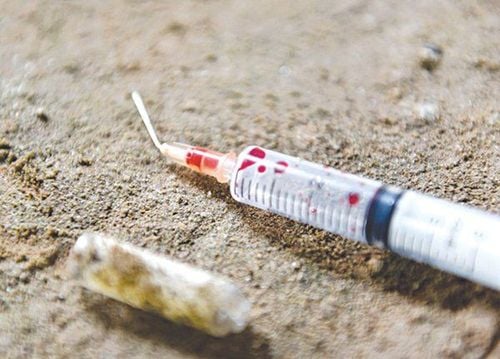This is an automatically translated article.
Untreated syphilis can affect the heart, blood vessels, brain and nervous system. At the same time, this disease also increases the chance of getting infected with HIV - the virus that causes AIDS. Over time, it can damage organs in the body and even lead to death.
1. Syphilis
Syphilis is a bacterial infection that is usually spread through sexual contact. It starts with pain but doesn't cause pain - typically on the genitals, rectum, or mouth. Syphilis is spread from person to person through skin or mucous membranes that come into contact with sores. After an infection, the syphilis bacteria can partially hibernate in the body for decades before it becomes active again. Syphilis detected early is curable, sometimes with just a single injection of penicillin. However, an infection that goes untreated can cause serious damage to your heart, brain or other organs and can be life-threatening. Syphilis can also be passed from mother to baby before birth.

Bệnh giang mai là bệnh lây lan qua đường tình dục
2. Syphilis treatment
Syphilis left untreated for several years, it can affect the heart, blood vessels, brain and nervous system, increasing the chance of contracting HIV, the virus that causes AIDS. Over time, it can damage organs in the body and even lead to death. Of course, if left untreated, it can be sexually transmitted to a partner. However, the disease is very easy to treat and cure in the early stages.
The recommended treatment for syphilis at all stages of this disease is the antibiotic penicillin, an antibiotic that can kill the organism that causes syphilis. If you are allergic to penicillin, your doctor may recommend a different antibiotic or recommend penicillin desensitization.
If primary, secondary, or early latent syphilis is diagnosed (defined as less than one year), the recommended treatment is a single penicillin injection. If you have had syphilis for more than a year, an additional dose of injection may be needed.
There are no over-the-counter drugs or home remedies that will cure syphilis - only antibiotics can do it.
On the first day of treatment for syphilis, a Jarisch-Herxheimer reaction may occur. Signs and symptoms include fever, chills, nausea, aches and pains, and headache. This reaction usually does not last more than a day.
3. Syphilis treatment for pregnant women
Penicillin G is the only effective antibacterial agent known to prevent mother-to-child transmission of syphilis and to treat fetal infections. Therefore, pregnant women should be treated with the appropriate dose of penicillin for the stage of infection.
Some evidence to suggest that add-on therapy is beneficial for pregnant women is for women with primary, secondary, or early latent syphilis, a second dose of benzathine penicillin 2.4 million units. IM may be given 1 week after the initial dose.
When syphilis is diagnosed in the second half of pregnancy, management should include fetal evaluation for congenital syphilis. However, this assessment should not delay treatment. Ultrasound findings of fetal or placental syphilis (ie, hepatomegaly, ascites, hydrocephalus, fetal anemia, or placental thickening) suggest a higher risk of fetal treatment failure; Cases accompanied by these signs should be managed in consultation with an obstetrician.
Women treated for syphilis during the second half of pregnancy are at risk of premature labor and/or fetal distress if treatment ends the Jarisch-Herxheimer reaction. These women should be advised to seek obstetric care after treatment if they notice any symptoms such as fever, contractions or decreased fetal movement. Stillbirth is a rare complication of treatment, but concern about this complication should not delay necessary treatment.
Missed dose is not acceptable for pregnant women being treated for late latent syphilis. Pregnant women who miss any dose of treatment must repeat the entire course of therapy.
All women with syphilis should be offered HIV testing.

Bệnh giang mai có thể lây từ mẹ sang con
4. Post-treatment management
After you are treated for syphilis:
Be sure to take all your medicines (drugs or injections), even if symptoms go away during treatment. Have blood tests and routine tests done to ensure response to usual doses of penicillin. Specific follow-up will depend on the stage of syphilis you were diagnosed with. Avoid having sex with new partners until treatment is over and blood tests show that the infection has been cured. Inform sexual partners so they can be tested and treated if necessary. Must be tested for HIV infection. And remember that treatment doesn't mean you can't get syphilis again or spread it later. The only way to do that is to avoid unprotected sex. When having sex, always use a condom. Vinmec International General Hospital offers a package of Examination and Screening for social diseases to help customers detect diseases early and have effective treatment and prevent dangerous complications. The screening package for social diseases at Vinmec is for all ages, both men and women.
When registering for the Social Disease Screening Package, customers will receive: Dermatology specialist examination; Perform tests such as: HIV Ab rapid test, Chlamydia rapid test, Treponema pallidium rapid test, qualitative and quantitative Treponema pallidum TPHA test, bacteriological smear test and staining fungal test soi...
To register for examination and treatment at Vinmec International General Hospital, you can contact Vinmec Health System nationwide, or register online HERE.
Reference source: Webmd.com; mayoclinic.org
MORE:
Syphilis: Causes, transmission, signs Syphilis can be transmitted from mother to baby through the placenta When to think about getting tested for STIs?













